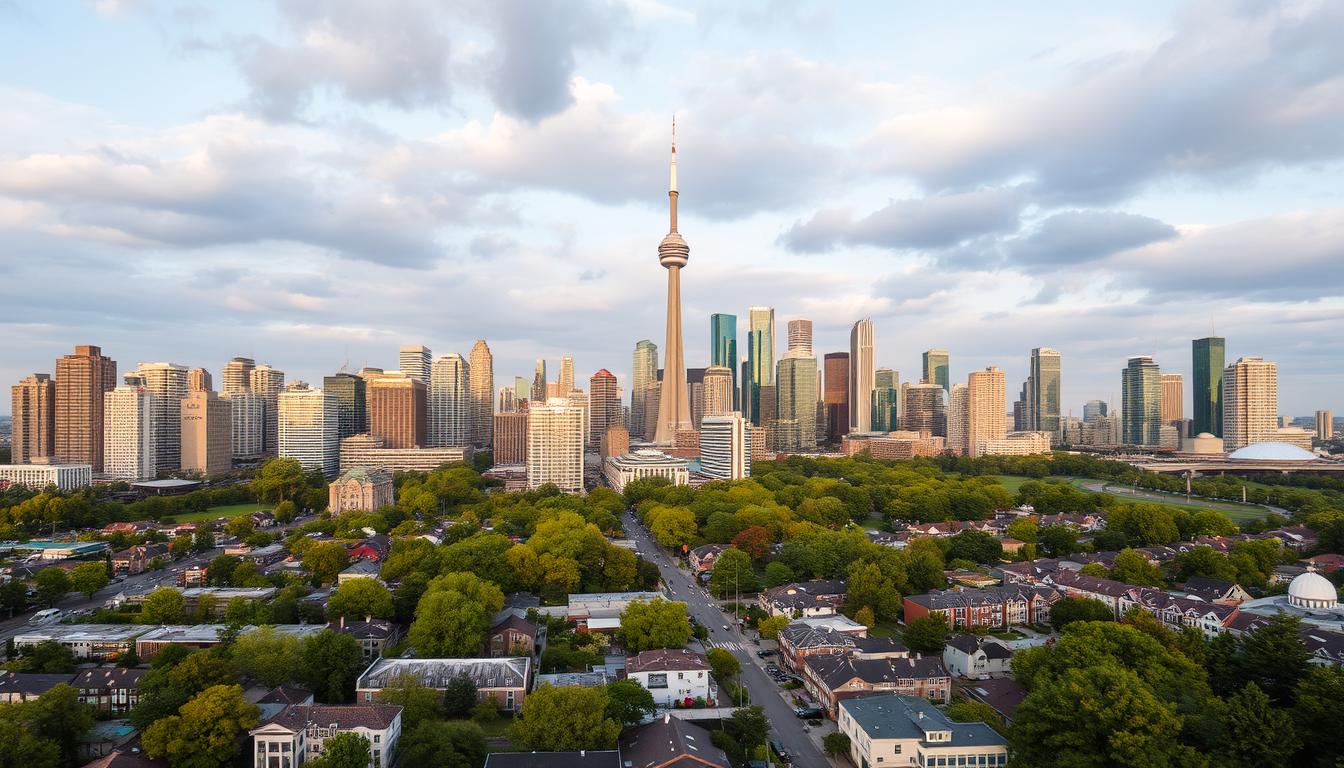Exploring the Toronto real estate market can be exciting but also challenging, especially for those buying a home for the first time. But with the right tools and advice, you can make your dream of owning a home in this lively city come true. This detailed guide will cover the market, financial needs, and the steps to buy a home in Toronto.

Key Takeaways
- Understand the current trends and pricing in the Toronto real estate market.
- Determine your financial readiness and explore various mortgage options.
- Navigate the step-by-step process of buying a home in Toronto.
- Discover strategies to build a strong down payment and save for additional expenses.
- Gain insights on working with real estate professionals and navigating closing costs.
Understanding Toronto’s Real Estate Market Landscape
Toronto’s real estate market has been a hot topic lately. The city’s housing prices keep making headlines. Let’s explore the trends and forecasts in this dynamic market.
Current Market Trends and Pricing Analysis
The Toronto housing market has seen steady growth. Home prices have reached new highs. The latest data shows an 8.2% year-over-year increase, reaching $1.1 million on average.
This growth is due to low-interest rates, limited supply, and high demand.
Neighbourhood Price Comparisons
Home prices vary across Toronto’s diverse neighbourhoods. The downtown core, with its lively urban vibe, has the highest prices, often over $1.5 million. Suburbs like Scarborough and Etobicoke offer more affordable options, with prices between $800,000 and $900,000.
| Neighbourhood | Average Home Price |
| Downtown Toronto | $1.5 million |
| Scarborough | $800,000 |
| Etobicoke | $900,000 |
| North York | $1.1 million |
Market Forecast and Predictions
Experts predict the Toronto housing market will keep growing, but at a slower pace. They expect moderate price growth, with a 5-7% annual increase. However, rising interest rates and policy changes could affect the market.

“The Toronto real estate market remains highly competitive, with demand consistently outpacing supply. While we may see some cooling in the pace of price appreciation, the city’s long-term appeal as a desirable place to live and work will continue to drive the market forward.”
– Jane Doe, Real Estate Analyst
Financial Prerequisites for Home Ownership
Buying a home in Toronto needs careful financial planning. You must consider your credit score, debt-to-income ratio, and savings before starting. These are key steps to take.
Your credit score is very important for getting a mortgage. Lenders look for a score of 680 or higher. This shows you can handle your finances well. If your score is lower, you can work on improving it by paying off debt and fixing any credit report errors.
Your debt-to-income (DTI) ratio is also crucial. It compares your monthly debt to your income. Lenders want a DTI of 43% or less. This means you can manage your mortgage and other debts easily.
| Financial Prerequisite | Recommended Guideline |
| Credit Score | 680 or higher |
| Debt-to-Income Ratio | 43% or lower |
| Savings | 20% of home value for down payment |
Having enough savings is also key. Lenders usually ask for a 20% down payment. This helps you avoid extra insurance costs and get better mortgage terms. You’ll also need money for closing fees, legal costs, and home inspections.
By checking your financial readiness and matching your goals with Toronto’s home ownership needs, you can start your journey to becoming a homeowner.

Mortgage Options and Lending Requirements in Toronto
Exploring Toronto mortgages can seem overwhelming. But knowing the options and requirements is key for both new and experienced buyers. Let’s look at what you need to know to find the perfect mortgage for your Toronto home.
Fixed vs Variable Rate Mortgages
In Toronto, you can choose between fixed and variable rate mortgages. Fixed rates stay the same, while variable rates change with the market. Think about your financial goals and how much risk you’re willing to take to pick the right one for you.
First-Time Home Buyer Programs
Toronto offers special programs for first-time buyers. These include help with down payments, tax credits, and better loan terms. Check if you qualify for these programs by looking into their rules and how to apply.
Government Lending Regulations
Lenders in Toronto must follow strict rules. This includes a mortgage stress test and limits on how much you can borrow. Knowing these rules helps you meet requirements and avoid delays in your application.
| Mortgage Option | Pros | Cons |
| Fixed-Rate Mortgage | Predictable monthly paymentsEasier budgeting | May have higher interest ratesLess flexibility if market rates drop |
| Variable-Rate Mortgage | Potential for lower interest ratesMore flexibility to take advantage of market changes | Monthly payments can fluctuateHigher risk tolerance required |
Understanding Toronto’s mortgage scene helps you navigate the home-buying journey. Always talk to a mortgage expert to explore your options and make a smart choice.
Buy Home in Toronto: Step-by-Step Process
Buying a home in Toronto’s lively real estate market is both thrilling and complex. We’ve broken down the main steps for a smooth home buying process. This will help you through the Toronto real estate transaction and property purchase.
- Property Search: Start by looking at listings, visiting open houses, and teaming up with a trusted real estate agent. This will help you find homes that fit your budget and lifestyle.
- Mortgage Pre-Approval: Get pre-approved by a lender to know how much you can borrow. This also makes your offer stronger when you find a home.
- Making an Offer: When you find your dream home, your agent will help you make a strong offer. This offer should match the market and any special conditions.
- Negotiation and Acceptance: Be ready to negotiate with the seller’s agent to agree on a price and terms that work for both sides.
- Home Inspection: Get a professional to check the home for any problems or repairs needed.
- Finalizing Financing: Finish your mortgage, get insurance, and complete all paperwork for a smooth home buying process.
- Closing the Deal: At the end, you’ll sign documents, pay for the home, and officially own it.
The home buying process in Toronto might seem tough, but with the right help and preparation, you can do it confidently.
“The key to a successful home buying process in Toronto is to stay informed, work with experienced professionals, and be prepared to adapt to the dynamic market conditions.”
Down Payment Strategies and Saving Tips
Buying a home in Toronto is a big financial step. But, with the right down payment strategies and saving tips, you can make it happen. Whether you’re buying for the first time or upgrading, there are many ways to get the money you need.
Traditional Saving Methods
The simplest way to save for a home is through budgeting and regular savings. This method helps you build up your funds slowly. It also teaches you to manage your money well.
Try automatic transfers, cut back on spending, and find extra income. These steps can help you save faster.
Government Assistance Programs
In Toronto, there are housing assistance programs to help homebuyers. The First-Time Home Buyer Incentive gives up to 10% of the home’s value as equity. This lowers the down payment needed.
The Home Buyers’ Plan lets you take up to $35,000 from your RRSP for a home. This can also help with your down payment.
Alternative Funding Sources
If you don’t have much saved, look into other funding options. Crowdfunding is a way for friends and family to help. Some employers also offer down payment help.
By using traditional saving, government help, and other funding, you can get the money for your Toronto home. This way, you can make your dream of homeownership come true.
“Saving for a home can be a challenging, but rewarding, journey. By understanding the various options available, you can develop a comprehensive plan to achieve your homeownership goals.”
Property Types and Investment Considerations
Exploring the Toronto property types is key for anyone buying a home here. The city offers condos, townhouses, and detached homes. Each type has its own benefits and considerations for buyers.
Condominiums are a popular choice for their convenience and amenities. But, buyers should think about the condo fees and how much the property might be worth in the future.
Townhouses offer more room and could increase in value over time. They’re a good mix of affordability and growth potential. Detached homes, meanwhile, are the most expensive but offer the most freedom and space.
| Property Type | Advantages | Considerations |
| Condominiums | Affordable entry pointAmenities and low maintenance | Condominium feesPotential for value appreciation |
| Townhouses | More space than condosPotential for greater appreciation | Higher prices than condosShared walls and maintenance |
| Detached Homes | Highest level of autonomyPotential for greater value growth | Highest pricesGreater maintenance responsibilities |
Choosing the right Toronto property type requires thorough research. Understanding the market and investment aspects is crucial. This way, you can make a smart choice and meet your real estate investment goals in this lively city.
Working with Real Estate Professionals
Buying a home in Toronto is easier with the right professionals. You’ll need a good real estate agent, a property lawyer, and a home inspector. They help you through the complex home buying process.
Choosing the Right Real Estate Agent
The Toronto real estate market moves fast. You need an agent who knows the local market well. Look for someone with knowledge of the areas you like, strong negotiation skills, and a focus on client happiness.
Legal Requirements and Lawyer Selection
Legal steps in buying a home can be tricky. That’s why a good property lawyer is key. They make sure all the paperwork is correct, from the agreement to the title transfer. Choose a lawyer with Toronto experience and a good reputation.
Home Inspector Qualifications
- Get a certified home inspector to check the property you’re thinking of buying.
- Choose inspectors who are part of groups like the Ontario Association of Home Inspectors (OAHI) and know Toronto well.
- A good inspection can find problems that could affect the property’s value or need big repairs. It helps you make a smart choice.
| Professional | Importance | Qualifications to Look For |
| Toronto Real Estate Agent | Navigates the fast-paced Toronto real estate market and negotiates on your behalf | Extensive local market knowledge, strong negotiation skills, and a commitment to client satisfaction |
| Property Lawyer | Ensures all legal aspects of the transaction are handled properly | Experience in Toronto’s real estate market and a reputation for exceptional service |
| Home Inspector | Identifies potential issues with the property | Certification, membership in professional organizations (e.g., OAHI), and extensive experience evaluating homes in Toronto |
With a team of skilled professionals, buying a home in Toronto becomes easier. You can be confident in your investment and know it’s protected.
Understanding Closing Costs and Additional Expenses
Buying a home in Toronto is exciting, but knowing the costs is key. Closing costs and extra expenses can affect your budget. It’s important to plan and understand what you’ll face.
The land transfer tax is a big cost in Toronto. It’s based on your home’s price and can be 0.5% to 2.5%. You’ll also need to pay legal fees, which are between $1,000 and $2,500.
- Land transfer tax: 0.5% to 2.5% of the home’s purchase price
- Legal fees: $1,000 to $2,500
There are also hidden fees and additional expenses like moving costs and home inspections. These can increase your home buying expenses in Toronto.
| Expense | Estimated Cost |
| Moving Costs | $500 to $2,000 |
| Home Inspection | $300 to $500 |
| Utility Set-up Fees | $100 to $500 |
Knowing about Toronto closing costs and extra expenses helps you prepare. This makes buying a home in Toronto smoother.
Insurance Requirements and Property Tax Considerations
Buying a home in Toronto is exciting, but it comes with important financial responsibilities. You need to know about insurance and property taxes. Let’s look at what you need to prepare for these costs.
Home Insurance Options
Finding the right home insurance is key to protect your investment. Toronto offers many insurance options, from basic to comprehensive. It’s smart to compare policies from trusted providers to find the best fit for you.
Property Tax Calculations
Property taxes are a regular cost for homeowners in Toronto. The amount you pay depends on your property’s value, the local tax rate, and any exemptions. Knowing how to calculate property taxes helps you budget and manage this cost.
Title Insurance Explained
Title insurance is vital for homeowners. It protects you from financial losses due to title issues. This includes problems like hidden liens or ownership disputes. Title insurance gives you peace of mind and protects your investment in Toronto.
FAQ
What are the current trends and pricing in the Toronto real estate market?
The Toronto real estate market has seen steady growth. Home prices are rising in different areas. Our analysis gives insights into current trends, prices, and future predictions.
What are the financial requirements for buying a home in Toronto?
To buy a home in Toronto, you need a good credit score and manageable debt. You also need enough savings for a down payment and closing costs. We’ll explain these financial needs.
What mortgage options are available in Toronto, and what are the lending requirements?
Toronto has many mortgage options, like fixed-rate and variable-rate mortgages. We’ll discuss first-time home buyer programs and government lending rules. This will help you find the best financing.
What is the step-by-step process for buying a home in Toronto?
Buying a home in Toronto involves several steps, from searching for properties to closing the deal. We’ll walk you through this process, highlighting key milestones and challenges.
How can I save for a down payment and explore alternative funding sources?
Saving for a down payment can be tough. We’ll look at traditional saving methods, government programs, and other funding options. This will help you reach your down payment goals.
What types of properties are available in Toronto, and what are the investment considerations?
Toronto has a variety of properties, including condos, townhouses, and detached homes. We’ll overview these options and discuss investment considerations. This will help you make a well-informed decision.
How do I work with real estate professionals in Toronto?
Choosing the right real estate agent, lawyer, and home inspector is key. We’ll guide you on selecting these professionals and navigating legal requirements. This ensures a smooth transaction.
What are the closing costs and additional expenses associated with buying a home in Toronto?
Buying a home in Toronto comes with various costs, like land transfer taxes and legal fees. We’ll detail these costs to help you budget.
What insurance requirements and property tax considerations do I need to be aware of?
As a homeowner in Toronto, you’ll need the right insurance and understand property taxes. We’ll cover home insurance, property tax calculations, and the importance of title insurance.
Your Trusted Real Estate Agent in Toronto
Looking for expert assistance to buy or sell your property in Toronto? Contact us today to work with a professional real estate agent who knows the market inside and out!
Get in TouchBusiness Contact Details
- Address: 305 Milner Ave Unit # 312, Toronto, ON M1B 3V4, Canada. Get Direction - Google Map
- Contact Name: Sivage Sivagumaran
- Phone: +1 416-553-8902
- Email: sivagehomes@sivage.ca
Visit our website at SivageRealty.ca for the latest property listings and personalized services. Let us help you turn your real estate goals into reality. Your dream property is just a call away!
Disclaimer:
The content provided in this blog is for informational purposes only. We recommend consulting with a qualified professional before making any decisions based on the information provided. If you have any questions or concerns, please don't hesitate to reach out to us. Our contact information is available on the Contact page.




